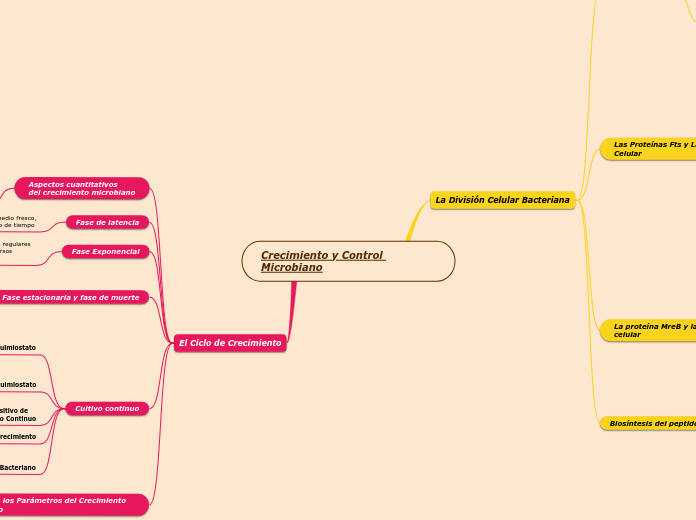door keyli armas 4 jaren geleden
701
Crecimiento y Control Microbiano

door keyli armas 4 jaren geleden
701

Meer zoals dit
In linguistics, syntax is the set of rules, principles, and processes that govern the structure of sentences in a given language, usually including word order.
A complex sentence is a sentence that contains an independent clause and one or more dependent clauses.
An independent clause can stand alone as a sentence, but a dependent clause even though it has a subject and a verb cannot stand alone.
Attributive clauses serve as an attribute to a noun (pronoun) in the main clause. This noun or pronoun is called the antecedent of the clause.
An adverbial clause is a group of two or more words that function as an adverb in a sentence.
Crecimiento de una Célula Individual
Son un reflejo de las etapas
Describe un ciclo de crecimiento
Posible sortear estos cambios
La población de células se puede mantener en la fase de crecimiento exponencial durante largos períodos, días o incluso semanas
Es un dispositivo en el que se puede controlar de manera independiente la velocidad de crecimiento (la rapidez con que se dividen las células) y la densidad celular (cuántas células se obtienen por mililitro)
An appositive clause follows another noun or noun phrase in apposition to it; that is, it provides information that further identifies or defines it.
Medida cuantitativa dispersión de luz
The subject clause is a dependent clause that acts as a subject.
A predicative clause may be introduced by conjunctions - that, whether, whether... or, as, as if, as though, because, lest, the way - or connectives.
The latter may be conjunctive pronouns - who, whoever, what, whatever, which - or conjunctive adverbs - where, wherever, when, whenever, how, why.
An adverbial is an individual word (that is, an adverb), a phrase, or a clause that can modify a verb, an adjective, or a complete sentence.
Traditional grammar defines the object in a sentence as the entity that is acted upon by the subject.
The indirect object identifies the person/thing for whom/which the action of the verb is performed.
The indirect object is usually a person or a thing.
Es el paso final de la síntesis de la pared celular
The direct object is the receiver of the action mentioned in the sentence.
Se puede pensar en el peptidoglicano como una tela resistente a la tensión, muy parecida a una lámina fina de goma.
The attribute is defined as a quality or characteristic of a person, place or thing.
MreB está relacionado estructuralmente con la proteína eucariótica actina, y FtsZ con la tubulina, también eucariótica.
Caulobacter crescentus es una especie de Proteobacteria
La inactivación del gen que codifica MreB en los bacilos hace que las células tengan forma de coco (redondas).
El principal factor determinante de la forma de las bacterias es una proteína llamada MreB, que forma un citoesqueleto simple en las bacterias y en unas pocas especies de Archaea.
The predicate of a sentence is the part that modifies the subject in some way. Because the subject is the person, place, or thing that a sentence is about, the predicate must contain a verb explaining what the subject does and can also include a modifier.
Durante la replicación bidireccional, la síntesis se produce en cada cadena molde de manera avanzada y retrasada, y esto permite que el DNA se replique lo más rápidamente posible
La proteína MinD forma una estructura en espiral en la superficie interna de la membrana citoplasmática y ayuda a MinC a situarse en la membrana citoplasmática.
FtsI
Proteína emparentada con la actina
FtsA
Es una de las varias proteínas de unión a la penicilina presentes en la célula.
ZipA
Es un anclaje que conecta el anillo FtsZ
Las proteínas Fts interaccionan en la célula para formar un aparato de división llamado divisoma.
Bacteria Grampositiva
Bacillus subtilis
Bacteria Gramnegativa
Escherichia coli
FtsZ
Proteína importante en la división celular
The subject of a sentence is the person, place, thing, or idea that is doing or being something. You can find the subject of a sentence if you can find the verb.
Ask the question, 'Who or what 'verbs' or 'verbed'?' and the answer to that question is the subject.
Como el aumento en el número de células.
Componentes celulares aumentan proporcionalmente